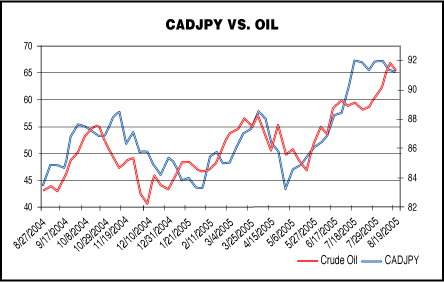Access to foreign exchange trading has opened up exciting trading options for the retail trader. You can now trade alongside corporations and institutions in a highly liquid market that is global, traded around the clock, and highly leveraged. Before jumping into this market, however, we must understand the factors that affect the forex market. With that in mind, STOCKS& COMMODITIES has introduced Forex Focus to better prepare the retail trader to participate in the currency market.
Ever thought of currencies as an alternative or supplement for oil? Maybe now you will.
Oil prices have been skyrocketing over the past year, with prices of light crude increasing 60% since January. Some traders think oil prices will continue to rally to $80 or even $100 a barrel, while others think that it is meeting resistance and, as a result, could turn lower from here on. Typically, traditional oil traders prefer to trade oil futures directly to express their views of where oil may be headed next, but many traders have been turning to the foreign exchange market as a supplemental or even alternative way to express those views. If you think oil prices are headed higher, the primary advantage of trading currencies instead of oil futures is the ability to earn interest. Not only could you capitalize on oil appreciation but you could also earn interest income.
HOW NOW, CRUDE?
The way to look at this is from a net oil importer/exporter perspective. Countries that benefit the most from rising oil prices are (naturally) major oil exporters. Countries that suffer the most are (usually) large oil importers. So with that in mind, the Canadian dollar/Japanese yen currency pair would be the perfect combination to use to express your view on oil prices. This is because Canada is the world's ninth-largest crude oil importer, while Japan imports close to 99% of their oil needs. Take a look at Figure 1. You'll see that there is an 80% correlation between the CAD/JPY and oil.
For those who think oil prices are going higher, not only would you earn the capital appreciation, but because Canada offers an interest rate of 2.75% and Japan is offering an interest rate of 0%, being long CAD/JPY would earn you an annualized interest income of 2.75% (2.75-0). This rate may seem rather small, but because the FX market offers up to 100 to 1 leverage on the regular-sized accounts, the interest income becomes much more substantial.
Using just 10 to 1 leverage will increase the interest income from roughly 2.75% annually to 25% annually. Interest is paid out daily, so there is no need to worry about having to hold the position for a year before being able to earn the interest income. The only qualification is for the account to be on 2% margin. Leverage has its advantages, but leverage also comes with risks; your position becomes much more volatile and vulnerable to losses.
However, CAD/JPY doesn't have to be just an alternative for oil traders. It can also be a supplement. If you have a very strong view about the future direction of oil and want to look for another way to add a bit of diversification to your portfolio, CAD/JPY would be the optimal choice. As you can see in Figure 1, oil prices actually lead CAD/JPY prices most of the time, which means that you can compound your profits by expressing the same view in the spot market and maybe even at times catch a leg up on the market.

FIGURE 1: CAD/JPY VS. CRUDE OIL. The correlation between the two is just remarkable. Who would have guessed?
- Kathy Lien is the chief strategist of FXCM.Originally published in the November 2005 issue of Technical Analysis of STOCKS & COMMODITIES magazine. All rights reserved. © Copyright 2005, Technical Analysis, Inc.
Return to November 2005 Contents